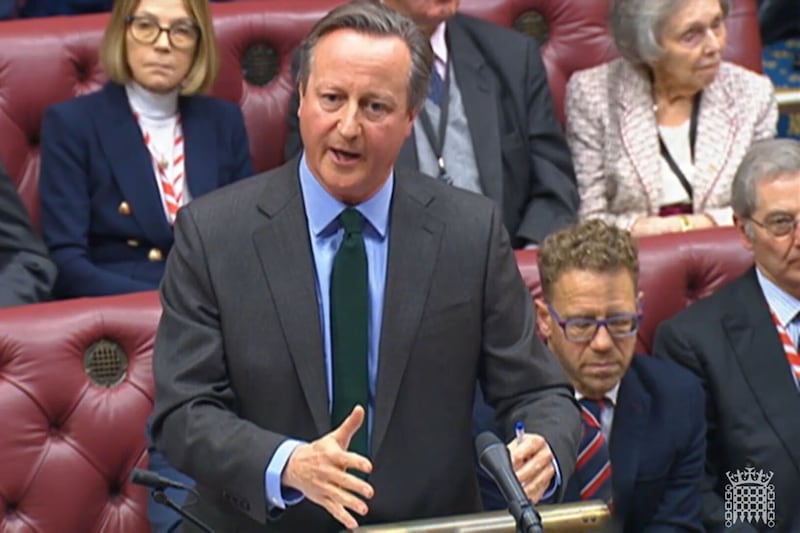WHEN the wheels of the digger are caked with mud it’s difficult to establish how much tread there is on the tyres. Likewise, when the airwaves are filled with ‘outrage and a growing sense of anger’ it can be hard to identify what the real problem is with the protocol. Arlene Foster yesterday said it had caused “societal and economic interruption”. It’s a broad, sweeping description that fails to specify the issues that need addressed. When pressed previously, the DUP leader cited “pot plants and ready meals” – what might be termed disparagingly by millennials as ‘First World problems’.
There are two distinct issues with the Irish Sea border. The first involves the trade and logistical difficulties that have arisen since the beginning of the year. Undeniably, there has been some disruption for online shoppers and empty shelves in supermarkets with supply lines based in Britain, while the new regulations around the movement of pets and animals do appear overly bureaucratic and exacting. But most businesses have reported no problems with the new arrangements and issues around steel tariffs and VAT on cars have been resolved promptly by the British government.
The second issue, and arguably the one that’s creating the greatest fuss, is political but more often than not it’s dressed up as apparent concern over trade and logistics. There's also a internal tension within political unionism – and unionists individually – over the protocol diminishing their Britishness yet being unable to admit as much should it be cast as a victory for nationalism.
Initially, Arlene Foster did make an effort, not to necessarily ‘own’ the Irish Sea border, but to at least recognise it was now the reality.
However, with the Ulster Unionists and TUV determined to capitalise on DUP vulnerability, political unionism was whipped up into a frenzy on the basis of a few idiosyncratic news stories focusing on how the new measures were impacting on garden centres and dirty diggers being transported from Scotland.
What Boris Johnson characterised as “teething problems” were easily foreseen, however, given that a new trading regime was effectively coming into force overnight, with a period of grace for some sectors. So to decry the protocol in its entirety based on a few initial glitches and hitches is unfair.
The near hysteria that has been evident this week has been about the DUP, spooked by the results of LucidTalk’s opinion poll, seeking to regain the initiative. The self-appointed, self-serving spokesmen of certain loyalist factions and a teenager armed with a spray can have given its charge some gravity, as did the EU’s cack-handed intervention on the movement of Covid vaccines. The latter is perhaps a cautionary tale to remind us that Brussels will not automatically act in Ireland’s best interests all of the time but at least the mistake was quickly rectified and acknowledged in most quarters as such.
But where the DUP goes with its latest five-point plan to wreck the protocol is unclear. Its celebrated petition yesterday passed the 100K mark, meaning potentially the party's eight MPs and a handful of Tory sympathisers will voice their concerns about the protocol to what will likely be an empty House of Commons.
Ultimately though, the solution to all these problems lies with the EU and Boris Johnson’s government, neither of which has paid much heed to the party when the chips were down. Meanwhile, there’s every likelihood that its hurried bid to unite unionism will inevitably crack due to petty politics and personalities.
As historian Brian Feeney noted earlier this week, unionism’s history of adopting a non-cooperation policy has never succeeded. In the past whenever unionists walked away from the table, he said, “there was less on it when they returned".
By insisting that the protocol be abolished altogether, Mrs Foster has set the bar unrealistically high and while she is correct in her desire for permanent solutions rather than an extended grace period, the template is not going to change.
When Foreign Affairs Minister Simon Coveney said the protocol was here to stay, it was a statement of fact rather than rhetoric. Talk of ditching this vital element of the Withdrawal Agreement on the basis of minor hiccups that with the proper will can be easily overcome, is for the birds. The best the DUP can hope for is Northern Ireland Protocol v2 but its difficulty will be managing yet another climbdown.
In the meantime, London, Dublin and Brussels need to redouble efforts to overcome genuine grievances as quickly as possible and ensure we don’t fall off a cliff when the grace period lapses. Collectively, they are the ones who own the Irish Sea border and it’s largely within their gift to make it as frictionless as possible – ensure the tyres are free of mud when the rubber hits the road.








